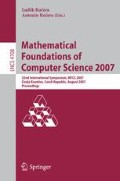Abstract
Living organisms function according to complex mechanisms that operate in different ways depending on conditions. Evolutionary theory suggests that such mechanisms evolved as result of a random search guided by selection. However, there has existed no theory that would explain quantitatively which mechanisms can so evolve in realistic population sizes within realistic time periods, and which are too complex. In this paper we suggest such a theory. Evolution is treated as a form of computational learning from examples in which the course of learning is influenced only by the fitness of the hypotheses on the examples, and not otherwise by the specific examples. We formulate a notion of evolvability that quantifies the evolvability of different classes of functions. It is shown that in any one phase of evolution where selection is for one beneficial behavior, monotone Boolean conjunctions and disjunctions are demonstrably evolvable over the uniform distribution, while Boolean parity functions are demonstrably not. The framework also allows a wider range of issues in evolution to be quantified. We suggest that the overall mechanism that underlies biological evolution is evolvable target pursuit, which consists of a series of evolutionary stages, each one pursuing an evolvable target in our technical sense, each target being rendered evolvable by the serendipitous combination of the environment and the outcome of previous evolutionary stages.
Access this chapter
Tax calculation will be finalised at checkout
Purchases are for personal use only
Preview
Unable to display preview. Download preview PDF.
References
Bäck, T., Fogel, D.B., Michalewicz, Z. (eds.): Handbook of Evolutionary Computation. Oxford Univ. Press, Oxford (1997)
Bejerano, G., et al.: Ultraconserved elements in the human genome. Science 304, 1321–1325 (2004)
Blumer, A., Ehrenfeucht, A., Haussler, D., Warmuth, M.K.: Learnability and the Vapnik Chervonenkis dimension. J. ACM 36(4), 929–965 (1989)
Bürger, R.: The Mathematical Theory of Selection, Recombination, and Mutation. Wiley, Chichester (2000)
Darwin, C.: On the origin of species by means of natural selection. John Murray, London (1859)
Dermitzakis, E.T., et al.: Conserved non-genic sequences - an unexpected feature of mammalian genomes. Nature Reviews Genetics 6, 151–157 (2005)
Drake, J.W., et al.: Rates of spontaneous mutation. Genetics 148, 1667–1686 (1998)
Ehrenfeucht, A., Haussler, D., Kearns, M., Valiant, L.G.: A general lower bound on the number of examples needed for learning. Inf. and Computation 82(2), 247–261 (1989)
Fischer, P., Simon, H.U.: On learning ring-sum expressions. SIAM J. Computing 21(1), 181–192 (1992)
Fisher, R.A.: The Genetical Theory of Natural Selection. Oxford University Press, Oxford (1930)
Garey, M.R., Johnson, D.S.: Computers and Intractability: a Guide to the Theory of NP-Completeness. Freeman, San Francisco (1979)
Helmbold, D., Sloan, R., Warmuth, M.K.: Learning integer lattices. SIAM J. Computing 21(2), 240–266 (1992)
Hoeffding, W.: Probability inequalities for sums of bounded random variables. J. Amer. Stat. Assoc. 58, 13 (1963)
Kearns, M.: Efficient noise tolerant learning from statistical queries. J. ACM 45(6), 983–1006 (1998)
Kearns, M., Valiant, L.G.: Cryptographic limitations on learning Boolean formulae. J. ACM 41(1), 67–95 (1994)
Kearns, M., Vazirani, U.: An Introduction to Computational Learning Theory. MIT Press, Cambridge (1994)
Kimura, M.: Evolutionary rate at the molecular level. Nature 217, 624–626 (1968)
Kumar, S., Subramanian, S.: Mutation rates in mammalian genomes. Proc. Nat. Acad. Sci. 99, 803–808 (2002)
Papadimitriou, C.H.: Computational Complexity. Addison-Wesley, Reading, Mass (1994)
Pitt, L., Valiant, L.G.: Computational limitations on learning from examples. J. ACM 35(4), 965–984 (1988)
Roff, D.A.: Evolutionary Quantitative Genetics. Chapman & Hall, New York (1997)
Ros, J.P.: Learning Boolean functions with genetic algorithms: A PAC analysis. In: Whitley, L.D. (ed.) Foundations of Genetic Algorithms, pp. 257–275. Morgan Kaufmann, San Mateo, CA (1993)
Valiant, L.G.: A theory of the learnable. C. ACM 27(11), 1134–1142 (1984)
Valiant, L.G.: Robust logics. Artificial Intelligence Journal 117, 231–253 (2000)
Valiant, L.G.: Knowledge infusion. In: Proc. 21st National Conference on Artificial Intelligence, AAAI 2006, pp. 1546–1551 (2006)
Wagner, G.P., Altenberg, L.: Complex adaptations and the evolution of evolvability. Evolution 50(3), 967–976 (1996)
Wegener, I.: Theoretical aspects of evolutionary algorithms. In: Orejas, F., Spirakis, P.G., van Leeuwen, J. (eds.) ICALP 2001. LNCS, vol. 2076, pp. 64–78. Springer, Heidelberg (2001)
Wright, S.: Evolution and the Genetics of Populations, A Treatise. University of Chicago Press, Chicago (1968-78)
Author information
Authors and Affiliations
Editor information
Rights and permissions
Copyright information
© 2007 Springer-Verlag Berlin Heidelberg
About this paper
Cite this paper
Valiant, L.G. (2007). Evolvability. In: Kučera, L., Kučera, A. (eds) Mathematical Foundations of Computer Science 2007. MFCS 2007. Lecture Notes in Computer Science, vol 4708. Springer, Berlin, Heidelberg. https://doi.org/10.1007/978-3-540-74456-6_5
Download citation
DOI: https://doi.org/10.1007/978-3-540-74456-6_5
Publisher Name: Springer, Berlin, Heidelberg
Print ISBN: 978-3-540-74455-9
Online ISBN: 978-3-540-74456-6
eBook Packages: Computer ScienceComputer Science (R0)

